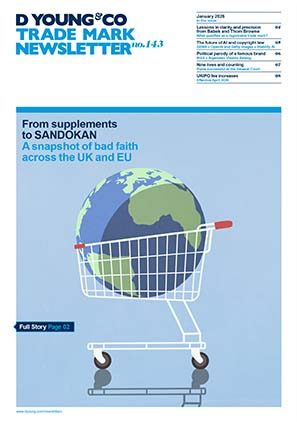MYBACON: a deceptive trade mark for meat substitutes
The applicant, Myforest Foods, applied to register MYBACON as a European Union trade mark (EUTM) for goods including meat substitutes and fungi based meat substitutes in class 29.
The application received an absolute grounds refusal, on the basis that the mark was liable to deceive the relevant public as to the nature of the goods in question (Article 7(1)(g) European Union Trade Mark Regulations (EUTMR)).
The refusal (upheld by the Board of Appeal) was appealed to the General Court. In its decision to dismiss the appeal, the General Court set out some useful reminders and guidance on deceptive trade marks, including the following points.
When is a trade mark deceptive?
A trade mark application should be refused where the mark is of such a nature that it deceives the public as to the nature, quality or geographical origin of the goods. Such a refusal requires the existence of actual deceit or a “sufficiently serious risk of deception”.
The rationale behind deceptiveness refusals is that a mark cannot fulfil its function of guaranteeing origin if it contains information that deceives the public.
When considering whether a mark is deceptive, the European Union Intellectual Property Office (EUIPO) must consider the mark in question, the goods in question, and the perception of the mark by the relevant public. The relevant public will be deceived when they are led to believe that goods possess certain characteristics which they in fact do not.
On the facts, it was found that there was a serious risk that a significant part of the English-speaking general public, when encountering the sign MYBACON on meat substitutes, would erroneously be deceived into purchasing those goods, thinking that they contained pork.
Who is the relevant public?
The relevant public must be assessed in light of the relevant goods. The General Court found the relevant public could not be limited to vegetarians, since anyone was likely to acquire meat substitutes. It followed that meat substitutes were intended for general consumption and the average consumer was the general public, who purchase food products quickly and without a great deal of attention.
In any event, in response to Myforest Foods’ (erroneous) claim that the average consumer was limited to consumers of meat substitutes who are particularly interested in the composition of food, the General Court highlighted that offering consumers an opportunity to check ingredients does not preclude a trade mark relating to food from being misleading.
What if a non-deceptive use of the mark is possible?
A mark must be refused as deceptive even if a non-deceptive use of the mark is possible. The fact that the mark might also be perceived in a way that is not misleading is irrelevant.
It followed that even if “bacon” was also used to designate bacon from vegetarian sources this was irrelevant, as the word also continued to refer to pork meat products. In any event, the General Court found that evidence demonstrating use of ”vegan bacon” did not establish that ”bacon” had become a generic term in isolation.
Can the addition of other elements alter the deceptive nature of a mark?
In some circumstances, the addition of other elements can result in a mark being registrable. Indeed, Myforest Foods cited various other registrations for meat substitutes, including BEYOND BACON, IMPOSSIBLE MEAT and FUTURE BURGER. However, the General Court noted that these signs contained additional words the meaning of which indicated that the goods covered were in fact not meat or burgers, but different goods, and as such these marks were not deceptive.
Myforest Foods argued that the addition of “MY” altered the deceptive nature of MYBACON. It was argued that “MY” would either be regarded as an abbreviation of “mycelium”, meaning fungi, or it would be perceived in the possessive pronoun sense, and as meaning that the bacon was specifically developed for “me” and “my” particular dietary requirements.
However, the General Court reiterated that where there is one perception that leads to deception, a mark is to be regarded as deceptive. One perception of MYBACON was pork bacon made for “me” and so the existence of other alleged perceptions, including fungi bacon, was deemed insufficient. Consequently, the appeal was dismissed.
Case details at a glance
Jurisdiction: European Union
Decision level: General Court
Parties: Myforest Foods Co v EUIPO
Citation: T 107/23
Date: 29 November 2023

